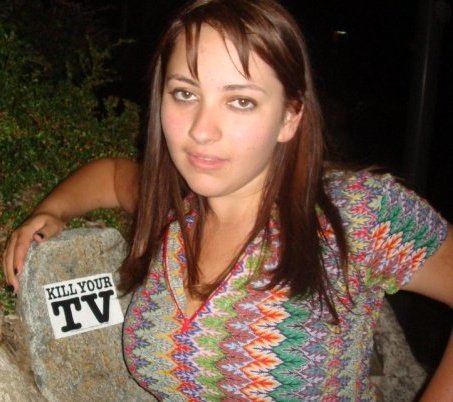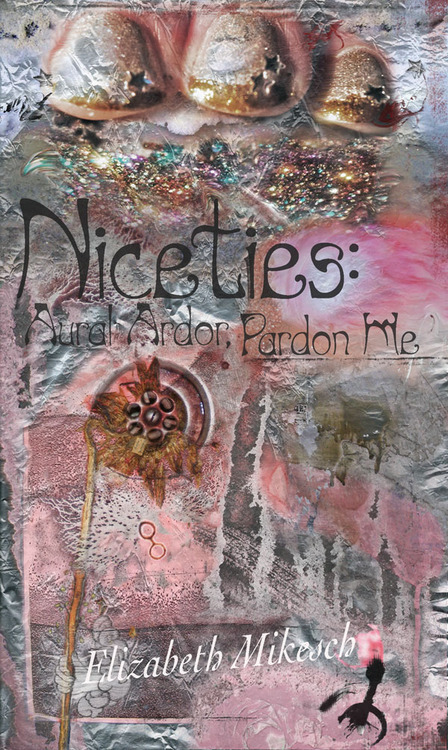
Go Forth is a series curated by Nicolle Elizabeth that offers a look into the publishing industry and contemporary small-press literature. See more of the series.
Elizabeth Mikesch’s book of stories, Niceties, is out from Calamari Press. The stories in Niceties push the boundaries of language and dissonance in a way that’s uncommon and rarely seen in fiction, which is only one of the reasons this book is so great. Also, Niceties has received favorable words from Noy Holland, Gary Lutz, Peter Markus, and Blake Butler. Her other work has appeared in places such as Unsaid and The Literarian. I met Elizabeth in Seattle at AWP when we signed books together. The first night I met her, at Whiskey Bar on Second, I mentioned something about reading an article in Harper’s or the New Yorker or somewhere, and before I could finish she looked at me and said, “Fuck articles.” From there we hit it off.
—Brandon Hobson
Brandon Hobson: Can you tell me how your book came to be published by Derek White at Calamari?
Elizabeth Mikesch: Derek White is the best. He is his own dialect. I sent him saturated e-mails anxiously awaiting to hear if he’d be into reading what I had. I had eaten nothing but squid for five years. People would say “O, you’re showing.” When I found out he was going to publish the work, I had diner cheese fries, stayed up until 6am. I woke up late and blew an interview to be a barista.
BH: Niceties doesn’t seem to follow a traditional structure. I like the strangeness of Niceties.
EM: Niceties is hard to know, which I get. Plots are for dying in. The book took becoming a special type of sociopathy for sound to write it among many a home bug infestation, psychic pica, and the internet in general. Yet the heart still can swell.
BH: You’re like me, but more social. Interviews are weird, yeah?
EM: Interviews make me not talk like my life self. I go into the Niceties voice, but let’s stay with that. I wish that it were like 1978, and you had to talk to me on a beigeish phone with a curly fry cord and jot, and I had not to go out and wait for the call because otherwise the interview wouldn’t happen that night, and if I had to pee or something, I’d have to say, “Hold on. I’m going to have to put the phone down.”
BH: I remember being a kid and talking on the phone. I twisted the phone cord around my fingers and neck.
EM: Or I miss gnawing cords. I should go buy one for my anxieties. Who were you talking to?
BH: Usually my parents. I would call them from the line in my brother’s room and talk. I’m not so great face-to-face.
EM: You’re funny.
BH: Do you prefer to focus more on language or image?
EM: All I have to offer is language. Language is delicious as it gets. I would like for my language to taste to others like a sandwich made by someone loving.
BH: Maybe your mother.
EM: My mother makes the most balanced sandwiches of any genre you desire.
BH: So, so nice.
EM: I have no aspirations in writing besides is everyone fed. “Are you satisfied?” is the big question at the end of the book. I hope you’ll feel full. Peter Markus used to say “You need this book, so maybe you miss out on your canned peaches for the week” one time. It stuck, and I think of it in baking aisles.

BH: You’re interested in other art forms.
EM: Mmhmm.
BH: How does the environment of the composition of music and film vary from your fiction?
EM: My ideal way to exist is alone on a road trip listening to music and pretending life is a movie. I weep, skitter, repeat. It’s uncool as hell.
BH: No, it’s cool.
EM: When I make little movies, I am trying to capture some more things that aren’t cool that I do by myself. To song write, I shit with my heart. It’s instinct. It comes, and I don’t work on it beyond a few minutes. I’m trying to hold still. I write songs in the car or in the bathtub.
BH: Since your fiction is more concerned with language than structure, can you talk about your intentions in your work?
EM: I want my stories to feel like when oil looks like a rainbow in water. I think Derek did a good job on the cover, those colors. I want to make the reader skip lunch to stay in a world. You skip lunch to go to the movies. You stay home and do nothing for a month so that you can go see a beautiful band.
BH: Yeah. Sometimes I get sad in this world.
EM: “Make a sad / make a sad / make a sad, sad song.” Just keep me out of the agreed-upon world as long as possible, please. At the same time, so many movies, songs, books: so many people in the world. They can grate. I love returning to an album or a movie later that moved me in such a way where you have to be going through the same tiny crisis to feel its weight. It becomes so intimate. On a stranger day, it wouldn’t do. You know? Like, when someone gets divorced, they need to watch “Dumb & Dumber” for the first time. I also love going on a strikes with things to better relive them. AKA the scratched Live Kid A in my car since sophomore year. No one is allowed to have an opinion about Radiohead. Every nasty opinion I hear about art makes me so bored.
BH: I’ve always loved Radiohead. And you have their lyrics tattooed on your feet.
EM: Fuck people!
BH: Fuck articles.
EM: Mmhmm.
BH: What are you doing?
EM: I’m cooking sausage. My roommate just played Kielbasafest. I’m pickling parsnips.
BH: I liked signing books with you in Seattle. If we did a book tour, what would our music be?
EM: On a book tour in the morning driving, we’d listen to Arthur Russell songs & Washington Phillips songs. I’d ask you questions about what you’d be like if you were a woman. Between the first town-to-town, I’d want very badly to eat roadside novelty food and sort of push you to do that with me, but I think you’d be down. I would go pee every forty-five minutes and say “I’ll be right back.“ I’d stay in there for a long time spacing out. Before that, I’d have forgotten you have to ask for the key.
BH: I’d start wondering where you were. I would worry and hope you’re ok.
EM: Don’t worry! I would also be flustered because it’s guaranteed that I lost my keys. I left my credit card in Seattle, by the way. Then, came back to Detroit and lost another one. And then you would be really dreading reading, and I’d keep saying, “I’ll read for you.” Then, you would say, “Hey, I’ll be right back, I’ll just be over there,” and you’d be talking to your devotees. Then we’d lose each other. You’d go catch up with some people you know, and I would have some blurry night trying to commune with nature, where I crawl into a river and die, and my ghost wakes up with a bloody symbol carved into my knee that means “Calamari pour la vie”, maybe ten or so squids conjoined, and you’d approach my corpse while the Smog song “Red Apples” plays and say, “Hey. Did you just get a tattoo last night? Or was that there?”
My ghost would float next to you for the rest of the tour insulting the people you had to meet and talk to about how you’re feeling about my death. We’d sing “Alloute,” happy and menacing. Only Francophile dogs would lift their heads.




